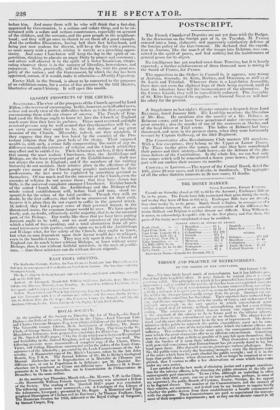GLOOMY PROSPECTS OF THE CHURCH.
STANDA Ito— The v;ew of the prospects of the Church, opened by Lord Eldon, is the reverse of encouraging. In this, however, as in all other cases, a clear and manly view of the difficulties before us is the first requisite to encountering them with any chance of success. The People of Eng- land (and the Bishops ought to know it) love the Church of England much, more than they love its prelates. These most reverend and right reverend persons may be well assured that they themselves will be, as on -every account they ought to be, the first victims of any great invasion of the Church. Miserably, indeed, are they mistaken, if they suppose that they arc less hated by the enemies of the Pro- testant religion than the great body of the clergy. Their supposed tvealth is, with such, a crime fully compensating the merit of any in- difference towards the interests of religion and the Church which they may affect and be entitled to. Their delusion is not less, if they doubt, that among the most zealous Churchmen, they, the Archbishops and Bishops, are the least respected part of the Establishment. Such was not always the case in England ; and if the members of the existing hierarchy do not maintain their relative place in the affections of the people (we mean of the Church-going people) maintained by their predecessors, the fact must be explained by something personal to themselves. Of too much zeal for the interests of the Church, even the enemies of religion do not accuse theta; that they have shown too little, is the universal complaint amongst Churchmen. If either branch of the united Church fall, the Archbishops and the Bishops of the whole united establishment will, before God and man, stand re- sponsible for the crime of the fatal sacrifice. Though they will, no doubt, be the first sufferers, that will be no atonement for their guilt, because it is plain they do not expect to suffer in the general wreck. If, indeed, they had a proper sense of their personal danger, in the threatened storm, the common danger would be over. We have spoken freely, and, no doubt, offensively, to the majority, that is, to the unsound pert, of the Bishops. But truths like these that we have been putting forward ought to be told ; and we avail ourselves a the privilege, which a habit of free-speaking, and a total abstraction from all per- sonal intercourse with parties, confers upon us, to tell the Archbishops and Bishops what, for the safety of the Church, they ought to know, but what no man dependent upon their favour would dare to whisper, even in the humblest tones. They may rely upon it that a Church of England can do much better without Bishops, at least without many Bishops, than it can without faithful ministers, in the rank of gentle- me», ei than these ministers can do without decent stipends.


























 Previous page
Previous page